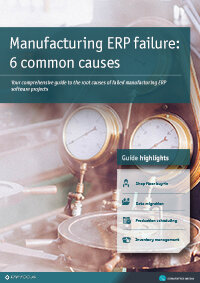ERP Failure Avoidance Guide: Part 1 - The Decision Making Process
There are two areas in which decision-making can put an implementation at risk of ERP failure. The first is in the case of poor or wrong decisions, which are hopefully recognized as such during testing. If not, it is almost impossible to unwind the decision and its implications during the chaos of live implementation. The second area is the case of no decisions, where an issue involves an interpretation or alteration to existing policy, but cannot be pushed to resolution when escalated to higher authority. Postponing an implementation is always preferable to an out-and-out ERP failure, but postponement is costly and unsettling, and is also a failure, although on a smaller scale.
Recognize When You Should Take it Upstairs
It is essential to establish an escalation policy early in the process that spells out as completely as possible when and what kind of decisions need to be escalated, and to whom. A critical strategic decision can prevent dozens of tactical decisions from being made. Examples of decisions which would typically exceed the ERP implementation team’s scope of authority might include changes to credit policy, increases in purchasing limits, changes to legal entity structure, changes that affect overseas operations, document verbiage, or changes to performance metrics that affect compensation. When escalating a decision to a higher level, be sure to communicate the issue in advance, along with the known option choices, and potential pros and cons of each choice. Since these decisions do not have a clear right and wrong (or else you would already have made it), you need to feel that the decision-maker has made an informed choice. Otherwise, testing the decision maker’s understanding of the implications of his or her choice can come across as confrontational. And, escalation and the chain of command being what they are, in a conversation that turns confrontational, you will lose.
Find Your Inner Diplomat
Getting these decisions made promptly and intelligently will test your interpersonal skills to the limit but are an important component if you’re to avoid ERP failure. Unfortunately, most decisions are already overdue before the escalation process kicks in. It is often difficult to get time on an executive’s schedule. Executives are normal human beings; they don’t always have the wisdom of Solomon when it comes to answering complicated questions. If they feel like they are being unfairly pushed into a corner they will potentially turn aggressive. Even if you explain in your most collaborative, results-oriented tone of voice that failure to make this decision could result in postponement of the ERP project, an executive might feel threatened. And remember, an executive does not experience any pain from a no-decision; you do.
Don't Miss: Steps to implementation success
ERP project managers who find themselves in this awkward position often choose to make decisions themselves as the least evil. While this will keep the project plan moving along, it is fundamentally wrong to empower middle management to dictate corporate policy. If you are an executive sponsor, part of a steering team, or a CFO, you have a responsibility to make certain that your ERP project team is getting decisions made by the right people, at the right time.
Free white paper

ERP Implementation Checklist
Over 120 actionable steps to implementing a new ERP successfully

Featured white papers
-

Manufacturing ERP Failure: 6 Common Causes
Get your comprehensive guide to the causes of manufacturing ERP failure
Download
Related articles
-

Top 10 causes of ERP implementation failure (and how to avoid it)
Few people in an organization ever understand how difficult an ERP implementation is, and how a f...
-

Secret KPI: Why Your ERP Implementation Team Matters More Than Software
Learn how Godlan ensures successful ERP implementation for manufacturers with proven strategies &...
-

9 hidden ERP costs that can blow your implementation budget
Discover critical cost areas of your ERP project that can wreck your budget

